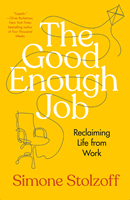The Good Enough Job: Reclaiming Life from Work
July 28, 2023
Simone Stolzoff reminds us that work is only a single facet of our lives—when we nourish the other identities that reside within us, we are much better for it.
 The Good Enough Job: Reclaiming Life from Work by Simone Stolzoff, Portfolio
The Good Enough Job: Reclaiming Life from Work by Simone Stolzoff, Portfolio
In the opening pages of The Good Enough Job, Simone Stolzoff introduces the reader to his Italian grandmother. Needing a way to support her five children after her husband’s death, she opened a coffee shop, which she ran for thirty years. “Her identity was straightforward,” Stolzoff writes. “First, she was a woman of faith. Then a mother, a grandmother, a sister, a fresh-pasta maker.” Her work running the coffee shop served its purpose of supporting her family and was even enjoyable, but it did not constitute her entire character.
In just a few generations, there’s been a shift in how we engage with work. Stolzoff describes the recent phenomenon of “workism,” in which white-collar workers see their jobs not just as a means to meet material needs but where “in addition to a paycheck, they provide meaning, community, and a sense of purpose.” He points to numerous economic and cultural factors that explain why work has become so central to our lives—for example, stagnant wages and a decrease in union memberships (and thus no access to collective bargaining for better work conditions) mean we’re working longer and longer hours to get our basic needs met. What follows, then, is the concept that if we’re going to spend all this time at work anyway, why not make it a reflection of the things we care about most?
Stolzoff notes that pursuing meaningful work that aligns with our passions is not an inherently bad idea. The right job can be an avenue through which we hone our craft or make a difference in our community. But jobs are volatile and largely out of our control—a company can go under, employees can get laid off, priorities can shift, and so on. Fundamentally, a job is meant to be an economic contract, a transaction through which we trade our time and effort for money. We can be grateful when that transaction also happens to bring us fulfillment, but we also can—and should—pursue that fulfillment elsewhere. Stolzoff recalls a conversation with one of his favorite poets, who tells him,
“Work will always be work. Some people work doing what they love. Other people work so that they can do what they love when they’re not working. Neither is more noble.”
Human beings are meant to be multi-faceted. We are meant to cultivate a wide array of identities based on where we are, who we are with, and what we care about. Remarking on the fact that Americans often begin conversations by asking, “What do you do?” Stolzoff considers whether a better question would be, “What do you like to do?” Job titles and places of employment are prone to change, but what we care about is more stable and reflective of our whole personality. Understanding these various aspects of our lives and actively engaging with them is better for our well-being, too. Stolzoff writes:
If your identity is entirely tied to one aspect of who you are—whether it be your job, your net worth, or your “success” as a parent—one snag, even if it’s out of your control, can shatter your self-esteem. But if you cultivate greater self-complexity and distinct sources of meaning, you’ll be better equipped to weather the inevitable challenges of life.
Throughout the book, Stolzoff weaves the stories of eight white-collar professionals with in-depth research to dispel certain notions about work that we have collectively enshrined as truths and that have kept us inordinately tied to our jobs, such as the idea that a workplace can be a family, or that longer hours lead to better work, or even that dream jobs exist. Though the individuals featured come from a variety of backgrounds and industries, they all go through a similar journey of anchoring their identities to a career, running into obstacles that bring that career to a halt and throw their sense of self into question, and finally, rediscovering who they are outside the scope of their employment.
After interviewing hundreds of people and spending many hours with the central characters of this book, I found that those with the healthiest relationships to their work had one thing in common: they all had a strong sense of self of who they were when they weren’t working.
These stories all reveal that to build a good life is to remember that work is only one facet of it. When we shift our full attention away from work and nourish the other identities that reside within us, we are much better for it.



